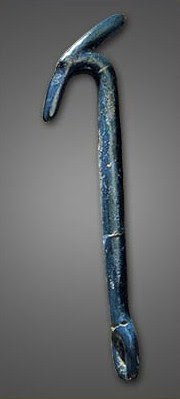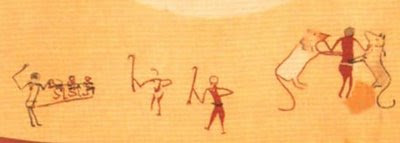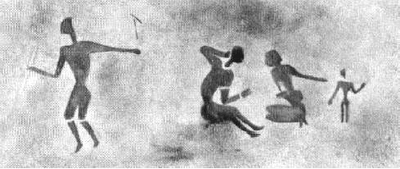Post by anansi on Jul 11, 2010 1:26:37 GMT -5
The Kemites did settle in other places beyond their immediate boarders, beginning with PepyII and the 11 and 12th dyn kings some of whom Senwosret and Amenemhat.sent out conquest in both directions north and south, at-least we have on record the settlement of a colony in the area of the Black Sea an ancient nation called Kolkhis.
Also whenever the Kemites got in trouble militarily from invaders out side the Nile Valley they high tail it south and royals on the move will mean a lot of folks will follow.
Sometimes they just got upset with a particular ruler and they will pack their bags and move. 250,000 at once now it seems like a high number but??? there it is.
On leaving this city (Meroe), and again mounting the stream, in the same space of time which it took you to reach the capital from Elephantine, you come to the Deserters, who bear the name of Asmach. This word, translated into our language, means "the men who stand on the left hand of the king."
These Deserters are Egyptians of the warrior caste, who, to the number of two hundred and forty thousand, went over to the Ethiopians in the reign of king Psammetichus.
The cause of their desertion was the following:- Three garrisons were maintained in Egypt at that time, one in the city of Elephantine against the Ethiopians, another in the Pelusiac Daphnae, against the Syrians and Arabians, and a third, against the Libyans, in Marea. (The very same posts are to this day occupied by the Persians, whose forces are in garrison both in Daphnae and in Elephantine.) Now it happened, that on one occasion the garrisons were not relieved during the space of three years; the soldiers, therefore, at the end of that time, consulted together, and having determined by common consent to revolt, marched away towards Ethiopia.
Psammetichus, informed of the movement, set out in pursuit, and coming up with them, besought them with many words not to desert the gods of their country, nor abandon their wives and children.
"Nay, but," said one of the deserters with an unseemly gesture, "wherever we go, we are sure enough of finding wives and children." [1]
Arrived in Ethiopia, they placed themselves at the disposal of the king. In return, he made them a present of a tract of land which belonged to certain Ethiopians with whom he was at feud, bidding them expel the inhabitants and take possession of their territory.
egyptsearchreloaded.proboards.com/index.cgi?board=hist&action=display&thread=102
More on the subject^ with appropriate links.
Not all migrations have to include everybody some people stayed put even during the dry Saharan phase some folks just adopted to the new conditions and the Bantu still lives in their supposedly original home land of Camaroon
Also whenever the Kemites got in trouble militarily from invaders out side the Nile Valley they high tail it south and royals on the move will mean a lot of folks will follow.
Sometimes they just got upset with a particular ruler and they will pack their bags and move. 250,000 at once now it seems like a high number but??? there it is.
On leaving this city (Meroe), and again mounting the stream, in the same space of time which it took you to reach the capital from Elephantine, you come to the Deserters, who bear the name of Asmach. This word, translated into our language, means "the men who stand on the left hand of the king."
These Deserters are Egyptians of the warrior caste, who, to the number of two hundred and forty thousand, went over to the Ethiopians in the reign of king Psammetichus.
The cause of their desertion was the following:- Three garrisons were maintained in Egypt at that time, one in the city of Elephantine against the Ethiopians, another in the Pelusiac Daphnae, against the Syrians and Arabians, and a third, against the Libyans, in Marea. (The very same posts are to this day occupied by the Persians, whose forces are in garrison both in Daphnae and in Elephantine.) Now it happened, that on one occasion the garrisons were not relieved during the space of three years; the soldiers, therefore, at the end of that time, consulted together, and having determined by common consent to revolt, marched away towards Ethiopia.
Psammetichus, informed of the movement, set out in pursuit, and coming up with them, besought them with many words not to desert the gods of their country, nor abandon their wives and children.
"Nay, but," said one of the deserters with an unseemly gesture, "wherever we go, we are sure enough of finding wives and children." [1]
Arrived in Ethiopia, they placed themselves at the disposal of the king. In return, he made them a present of a tract of land which belonged to certain Ethiopians with whom he was at feud, bidding them expel the inhabitants and take possession of their territory.
egyptsearchreloaded.proboards.com/index.cgi?board=hist&action=display&thread=102
More on the subject^ with appropriate links.
Not all migrations have to include everybody some people stayed put even during the dry Saharan phase some folks just adopted to the new conditions and the Bantu still lives in their supposedly original home land of Camaroon













